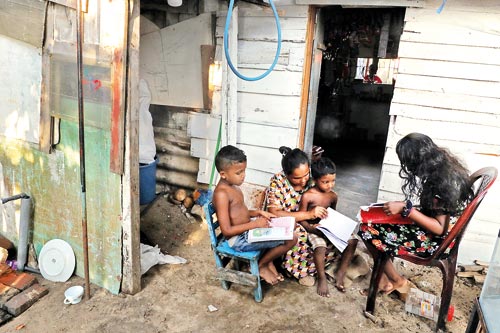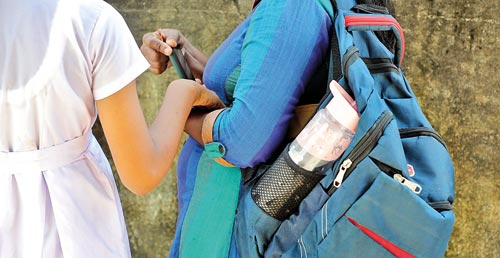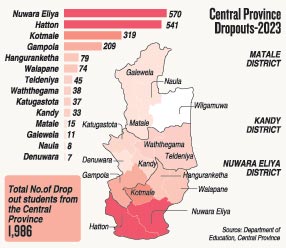News
Economic crisis throws book at education: Dropouts on the rise

Shashikala Anthony with her children aged 4, 7, and 11. Pix by M.A. Pushpa Kumara
“When I go to the parent-teacher meeting, the teachers say that only my children have perfect attendance in their relevant grades,” said Shashikala Anthony, a 29-year-old mother of three from Station Road in Dehiwala.
She and her husband are persistent in their efforts to educate their children, despite the rising cost of living. “My goal is to make sure that all of my children are educated; I am not willing to sacrifice their education.”
However, this is not the case for many. “Most of my friends only come to school twice or three times a week,” said Krishni, Shashikala’s daughter. Irregular attendance is on the rise as prices have made school books, uniforms, shoes and even meals unaffordable to many.
“The increase in dropouts started with COVID-19 and now, due to financial issues, parents are choosing to take their children to work with them instead of sending them to school,” said the principal of West Ward Tamil Vidyalaya in Nuwara Eliya. The school only teaches up to Grade 11 but now has a 6.5% dropout rate, with 16 of 245 students having dropped out.
In the estate sector, education is worst affected. In November 2022, the Institute of Policy Studies found that 4% of primary and 20% of secondary students in the estate sector were dropping out of school. According to the Central Province Department of Education, 1,986 students have dropped out of school in the 14 education zones. Of these, 1,430 are from estate sector areas such as Nuwara-Eliya, Hatton, and Kotmale.
 Before the economic crisis, too, lack of access to secondary and high schools led to students dropping out in estate areas, but the high cost of living and educational expenses have worsened the situation. “I would say about 70% of our students do not eat anything in the morning,” said the West Ward principal. “Dropout rates have increased because parents have no meals to give their children.”
Before the economic crisis, too, lack of access to secondary and high schools led to students dropping out in estate areas, but the high cost of living and educational expenses have worsened the situation. “I would say about 70% of our students do not eat anything in the morning,” said the West Ward principal. “Dropout rates have increased because parents have no meals to give their children.”
Another Nuwara Eliya principal said that many of the students were only eating plain rice or roti twice a day. “Because of the increasing cost of transport, meals, and books and more parents migrating for work, we are seeing a marked reduction in attendance,” he added.
The Household Survey on the Impact of the Economic Crisis – 2023, conducted by the Department of Census and Statistics, found that the schooling of 54.9 percent of those aged 3-21 was impacted by the economic crisis.

M. Devi with her daughter Nadeesha
Data show that the estate and rural sectors are hit the hardest, with 55.1 percent being affected. It was found that one of the main strategies adopted to mitigate the impact of the crisis was to either reduce expenditure on stationery or to completely halt purchases.
Mattakuliya resident M. Devi is using just such a strategy. She works part-time as a domestic worker and part-time at a local community centre. As a single mother with elderly parents, she finds it difficult to put her fifth-grade daughter through school.
“A simple CR book is Rs. 500,” she said, “and when it floods, we have to travel part of the way to school by bus and the other part by trishaw.”
One time, Ms. Devi was unable to afford shoes for her daughter and had to beg the principal to let her attend school in slippers until she found the money for new shoes. For stationary, tuition, and shoes, Ms. Devi spent Rs. 20,000 last year, but even this was not enough. Her daughter was absent from school for 25 days because the family was unable to afford the transport fees and stationery.
Thankfully, Ms. Devi is in contact with the school teachers, who are supportive and sometimes even bring meals to ensure that her daughter continues to attend.
The Sunday Times found that many teachers are using their own money to bring meals and stationery for students who are struggling.
According to Ceylon Teacher Service Union Secretary Mahinda Jayasinhe, in some schools, teachers and some students have formed “Bath Bankuwa (rice banks)” to help those students who cannot afford meals.
A further issue is the discrepancy between data and ground reality. Officially, a student is only considered to have dropped out of school if he or she did not attend classes for two consecutive months. But such data obscure the reality, as one principal from Batticaloa explained. “Only 36 students [out of 445], mostly from A-level classes, drop out completely, but 40–45 rarely attend, and that number is increasing,” she explained. “Nevertheless, we are not expected to track such data and hand it over to the department.”
Many students skip school to do seasonal work or due to a bad financial period. This absenteeism can add up to weeks or months each year.
The Sunday Times contacted 10 school principals. All of them mentioned a relatively small number of dropouts that they report back to the zonal education office but highlighted a much larger number of irregular attendees.
In addition, there is a lack of updated data. The Ministry of Education has yet to compile its annual school census for 2022 and 2023. Ministry officials told the Sunday Times that they could only provide the drop-out rate for 2021, which stood at 0.77%.
A National Education Commission official said that they were aware of an increasing trend of school dropouts and hoped to conduct targeted research on the issue soon. “We are also hopeful that the new education reforms that will be shortly presented to parliament will help solve the issue.”
 “It is difficult for me to send my children to school because I cannot afford books, meals, and clothes,” lamented 43-year-old Thushari Thilakarathna, a mother of four. Her 15-year-old daughter had stopped going to school for about two months when the police visited her house and warned that if her daughter was not sent to school, she would be fined. “How can we pay fines when we don’t even have money to live?” she lamented.
“It is difficult for me to send my children to school because I cannot afford books, meals, and clothes,” lamented 43-year-old Thushari Thilakarathna, a mother of four. Her 15-year-old daughter had stopped going to school for about two months when the police visited her house and warned that if her daughter was not sent to school, she would be fined. “How can we pay fines when we don’t even have money to live?” she lamented.
“I don’t like going to school because my classmates make fun of me because I don’t have proper school uniforms and shoes,” her daughter said with tears.
The 2024 book lists are yet to be released to parents, but according to one principal, the average cost will be about Rs. 16–17,000.
For the majority of Sri Lankan students who struggled last year, getting through school in 2024 will be another tough test.
The best way to say that you found the home of your dreams is by finding it on Hitad.lk. We have listings for apartments for sale or rent in Sri Lanka, no matter what locale you're looking for! Whether you live in Colombo, Galle, Kandy, Matara, Jaffna and more - we've got them all!

